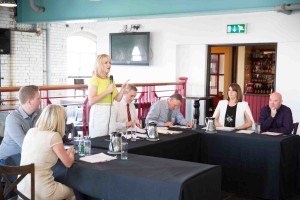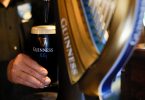The future of the pub, learning the lessons from the UK
At his presentation to the Joint Committee on Jobs, Enterprise and Innovation earlier in the day, the founder of the UK’s ‘Save the Pub’ All Party Parliamentary Group Lib-Dem MP Greg Mulholland had offered to help set up something similar here in Ireland to better engage with cross-party parliamentarians.
Now he’s speaking at a discussion forum in the Guinness Storehouse on the future of the Irish pub. He’s part of a panel comprising Deirdre Devitt of The Two Sisters pub in Terenure, Beoir’s John Duffy, Economist Tony Foley, Publin’s John Geraghty and VFI President Noreen O’Sullivan. The discussion is compered by broadcaster Claire Byrne.
Save the Pub’s success
An MP who speaks up for the pub at home in England, Greg Mulholland’s Save the Pub group began in 2009 and it came into being because no one was tackling government decisions or legislation that was “unsettling” the pub industry.
Greg doesn’t feel we’ve sufficient voice among our politicians here either.
His group met with a degree of success in getting some pubs listed as Assets of Community Value, “… but with the beer excise duty, we showed the government that reducing excise leads to economic growth,” he says.
Indeed the move on the much-despised Beer Duty Escalator was not only abolished but became three successive cuts in beer duty.
“Alistair Darling himself now agrees that the duty escalator was a mistake but we need to get politicians onboard with clear messages and not come across as whinging,” he warns.
Differential pricing in the supermarket needs to be looked at too, he believes.
“If politicians really care about the Irish pub then tell them to get behind it via a cross-party campaign.”
Over-pubbed here
Economist Tony Foley follows Greg to talk about the economics of the pub, where it has been and where it’s going.
The pub’s been in decline before the onset of the recession in 2008, he explains.
From 2000 to 2007 pub sales volumes dropped 10% at a time when overall consumer sales had risen by one-third.
“The acceleration of the decline in pub volumes since 2007 to 2014 – 35% compared to an overall retail sales decline of 9.6% – is not only due to the recession but also to a fundamental change in our drinking patterns,” he says.
Since 2007 total alcohol consumption had fallen 15%, with a huge shift to off-sales.
This was borne out by a continuing annual decline in pub volumes between 2008 and 2014 bears this out:
2008: -6.7%
2009: -10%
2010: -10.6%
2012: -5.1%
2013: -2.7%
2014: -0.5%
“As in Britain, pub numbers here also declined with the high tax on alcohol,” he says, “There was a decline in pubs in Ireland of around 1,500 between 2005 and 2014.”
Tony Foley also notes Greg Mulholland’s suggestion that the UK government consider introducing a differential excise tax for draught beer as has already been suggested here.
But many pubs survive because they’re innovative and/or have improved their décor, product range and food offer etc.
“The key issue is not past trends but having a positive attitude for the future,” he states, “The pub is a contributor to the community and to society and it tends to get minimal respect from politicians in this country.”
Tony Foley also points out that some 8,000 pubs serve a population of five million here where 48,00 pubs –six times this figure – serve a UK population of around 60 million – 12 times our own population figure, “… so we’re relatively over-pubbed here,” he stresses.
Getting to know your customers
Dublin publican Deirdre Devitt represents the fourth generation of her family in the pub business. They’ve two pubs – the Two Sisters in Dublin’s Terenure and Devitts in Camden Street.
She’s been involved in the Terenure operation for the last 20 years having left a career in the financial services sector.
“You have to know your customers” she stresses, “we’ve an established clientele in Terenure – retirees, for example, who don’t like music ruining their night.
“Then there are the younger couples moving into the area who’ve bought houses and have had to renovate them; they tend to bring their family to the pub so we need a family offering.”
The pub must make its offering special when these customers do come out, she adds.
Tapas Tuesday, a Mother & Baby group on a Wednesday morning and various functions all help put the pub in mind for a return visit at another time, she said.
“For our Customer Appreciation Night we’d 300 in the pub for a barbecue and a free drink.”
Devitt’s in Camden Street has been there for around 40 years, bearing witness to the changing times.
She remembers trying to sell a cocktail in Camden Street in the late 80s – “… a no-no”!
Now the expression ‘Camden Quarter’ had become fashionable when referring to this area.
They’ve a very traditional pub in the middle of Camden Street and so the food offering is very different from the Terenure pub in that it’s much more traditional in appeal.
“You need to find your niche in the market,” she concludes, “You must get to know your customers and do something well.”

The discussion panel (from table left): VFI President Noreen O’Sullivan, Publin’s John Geraghty, presenter Claire Byrne, MP Greg Mulholland, Economist Tony Foley, publican Deirdre Devitt and Beoir’s John Duffy.
Choice & quality simply not good enough
Beoir’s John Duffy explains the need for beer drinkers to be represented.
“The choice and quality of what was available was simply not good enough.”
Beoir began a decade ago with the dream of being able to walk into any pub and find something on tap from an independent brewery.
In the UK CAMRA had transformed the beer trade for pubs and consumers alike – and it keeps suppliers on their toes today, he adds.
“The new microbreweries represent the best chance to bring choice back to the Irish market,” he states.
Pubs and retail outlets need to form a united front rather than existing in a blame culture where pubs blame off-licences who, in turn, blame the supermarkets for the present situation, he observes.
A new look at the problem of alcohol abuse has to be adopted.
“Earlier closing times didn’t do it, higher pricing didn’t do it.”
He’d also ask publicans not to be swayed by the bigger suppliers offering inducements to get rid of the smaller ones.
But perhaps the real lesson from the UK is to see how well thought-out the pub offer there is.
“It needs to be something that can’t be got in Starbucks or at the cinema or at home,” he concludes.
Today’s rural Irish pub needs support
In looking at the role of the rural pub in the community VFI President Noreen O’Sullivan points out that there are 420 licensed premises in Tipperary and hers is a family-run pub in Nenagh which functions as the centre of community there.
“People are very dependent on the pub in preventing rural isolation,” she explains, “It also plays a huge part in our community after 90 years in business in Nenagh.”
The pub is involved in sponsorship, GAA, functions etc.
“Tourism is going to get us out of this recession” she believes, “so we need to recognise the importance of the pub and tourism.”
Today’s rural Irish pub needs support, even the great gastropubs.
But the tourist sees the pub as being expensive with one of the highest excise rates in Europe.
“High excise kills jobs and negatively affects the consumer and the tourist.”
In Tipperary alone 100 pubs had closed in the last 10 years.
Publicans and consumer embracing craft
Describing trends in the Dublin pub sector, Publin’s John Geraghty has been invited to sit in on a few LVA meetings in the last few years and he also notes that of the last 10 pubs to have opened in Dublin, “almost all” have been cocktail, wine or craft beer bars, a definite departure from the traditional Irish pub.
The experience and entertainment offer at these premises is different, he believes.
It’s in the nature of new bars to be going after the 25s demographic. They’ve given up on students and younger people. There seems to be no money available from this set.
Pubs in the city centre provide craft beer “… and it’s strange to think that craft beer represents just 2% of the beer market as it’s a trend that publicans and consumers seem to be embracing”.
People are more willing too to make a night of it in the pub, he observed, with beer-tasting evenings in some Dublin pubs becoming a popular attraction alongside whiskey tastings. This allows a younger generation to engage with whiskey.
Of course there’s always the question of price. A growing group of people will welcome Wetherspoon’s into the market, he says.
In summing up the session, broadcaster and MC for the evening Claire Byrne points out that unlike the UK, we just don’t have a champion for the pub sector here.
Social media and staff training, WiFi and craft beer seem to be the way forward.
As for negative perceptions of the drinks industry, denying the problem is what causes drinking behind closed doors and the question’s asked, does the industry need to change the message?
Perhaps make it about pubs, not the industry? And try to get cross-party politicians to work on this?
In Europe lobbying seeks to get a differential rate between on-trade sales and off-trade sales.
Shouldn’t we join the lobby for this in Europe?








